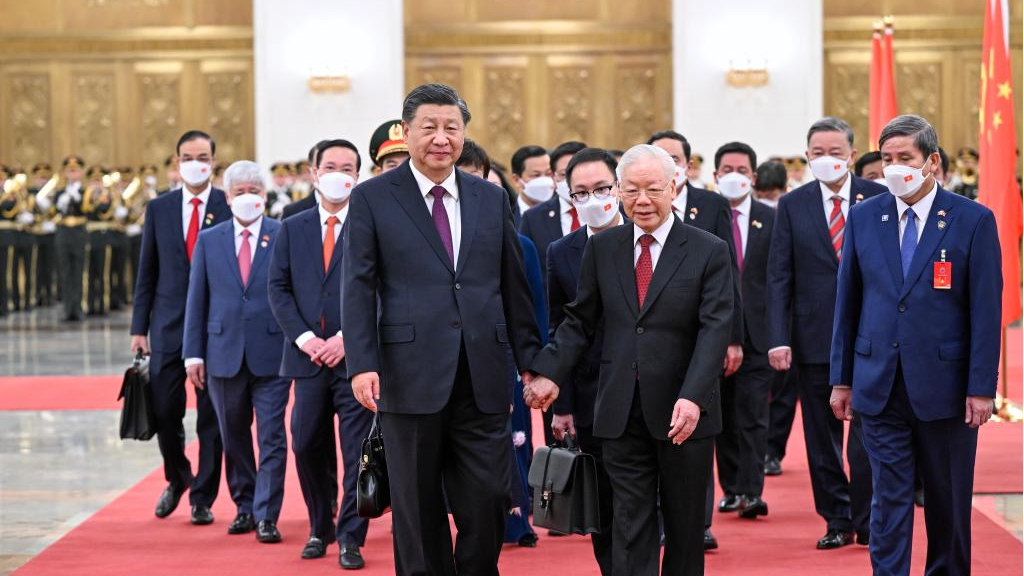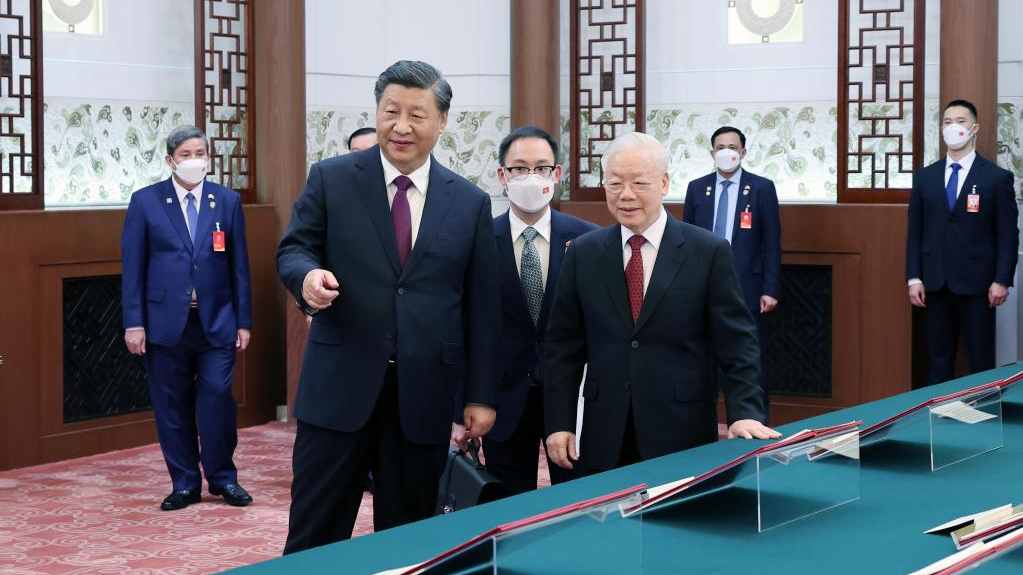
Xi Jinping, general secretary of the Communist Party of China Central Committee and Chinese president, and Nguyen Phu Trong, general secretary of the Communist Party of Vietnam Central Committee, head for the venue of their talks at the Great Hall of the People in Beijing, China, October 31, 2022. /Xinhua
Xi Jinping, general secretary of the Communist Party of China Central Committee and Chinese president, and Nguyen Phu Trong, general secretary of the Communist Party of Vietnam Central Committee, head for the venue of their talks at the Great Hall of the People in Beijing, China, October 31, 2022. /Xinhua
Editor's note: Wang Li is a professor at Jilin University in China. The article reflects the author's opinions, and not necessarily the views of CGTN.
At the invitation of Xi Jinping, general secretary of the Communist Party of China (CPC) Central Committee, his Vietnamese counterpart Nguyen Phu Trong led a high-level delegation to visit China from October 30 to November 2. Trong and his entourage received a warm welcome in Beijing on October 31, including a ceremony of presenting the Friendship Medal of China to Trong by Xi. It symbolizes the friendship of "comrades plus brothers" between the two countries and the two Parties as the two leaders vowed to cherish and preserve the foundation of Sino-Vietnamese relations.
Bilateral diplomacy has played an integral role in effecting the general agenda of Chinese foreign relations since the early 1950s. Inherited from the first-generation leadership of the CPC, the current one headed by Xi has made remarkable progress to promote the role of diplomacy in the new era. One seminal case is that the CPC held a high-level dialogue with political parties around the world in 2017 with the theme of rebuilding an international community with a shared future. It has been a major conduit to tell China's story under CPC leadership to the rest of the world.
China and Vietnam are neighboring countries and both are socialist states led by the Communist Party of each country. It is necessary to maintain inter-governmental dialogues over core issues, while charting the course of the inter-Party coordination, since they have revealed the sincerity and resolve to seek an early settlement of maritime disputes and the core issues concerned.
Over the past decade, the United States has driven the Indo-Pacific strategy to contain the peaceful rise of China. Accordingly, Washington has made tremendous efforts to win over the countries in the region to serve its geopolitical scheme. Some of the media, politicians and radical groups in the West have exaggerated the bitter memories of history entertained by Vietnam, so that people will be encouraged to confront China by its psychological and security concerns. This is the reason why the U.S. has tirelessly wooed Vietnam to join its challenge to the legitimate claims of China in the South China Sea and its accusation that "China has held back large amounts of the Mekong river waters in its reservoirs leading to a severe drought in Southeast Asia."

Xi Jinping, general secretary of the Communist Party of China Central Committee and Chinese president, and Nguyen Phu Trong, general secretary of the Communist Party of Vietnam Central Committee, view the cooperation documents signed by the two sides in Beijing, China, October 31, 2022. /Xinhua
Xi Jinping, general secretary of the Communist Party of China Central Committee and Chinese president, and Nguyen Phu Trong, general secretary of the Communist Party of Vietnam Central Committee, view the cooperation documents signed by the two sides in Beijing, China, October 31, 2022. /Xinhua
Yet, the major considerations in foreign policy-making of all countries including Vietnam are primarily geography, history and shared interests, including an ideological affinity. First, neither China nor Vietnam could change the reality that the two countries are linked with each other by the shared mountains and rivers. For many years, China has called for the six countries along the Lancang-Mekong River as a de facto community with a shared future linked by the same river and also has regularly shared annual hydrological information for the partners concerned with a view to better utilizing water resources while addressing climate change and the natural disasters involved. To that end, China has acted responsibly in terms of common interests with its neighbors, including Vietnam.
Second, China and Vietnam have shared a long-term friendship and solidarity in the fights against imperialism and hegemony over the last century and now they are facing the new tasks of how to build up a socialist system in accordance with its own scenario. Beijing and Hanoi have made clear their determination to further deepen good-neighborly relations in terms of long-term stability, good-neighborly friendship and all-round cooperation. Since the U.S. is so adamant in its anti-Communism stance, it would never be lenient to a Communist-led Vietnam. Given this, China and Vietnam need to work in concert on the issues of national security, social-economic security and ideological security to defend the common interests of socialist countries.
Third, since China is the largest economy in Asia, and Vietnam is seen as one of the most vibrant economies in ASEAN, the two sides have agreed to synergize their development strategies, such as the Belt and Road Initiative and the Two Corridors plus One Economic Circle. In return, they will further highlight and consolidate the socialist economic foundation between the two countries since Vietnam is China's largest trading partner in ASEAN with bilateral trade exceeding $230 billion in 2021.
To sum up, Trong's state visit to China sends a clear message to the world that Vietnam has followed its "four noes" policy: "not to join any military alliance, not to ally with any country targeting a third party, not to allow foreign countries to set up military bases in Vietnam or use its territory against other countries, and not to use force or threaten to use of force in international relations." Considering this, the relationship with China is still the priority in Hanoi's diplomacy because the solidarity between the two countries is the key to peace and development in the region.
(If you want to contribute and have specific expertise, please contact us at opinions@cgtn.com. Follow @thouse_opinions on Twitter to discover the latest commentaries in the CGTN Opinion Section.)